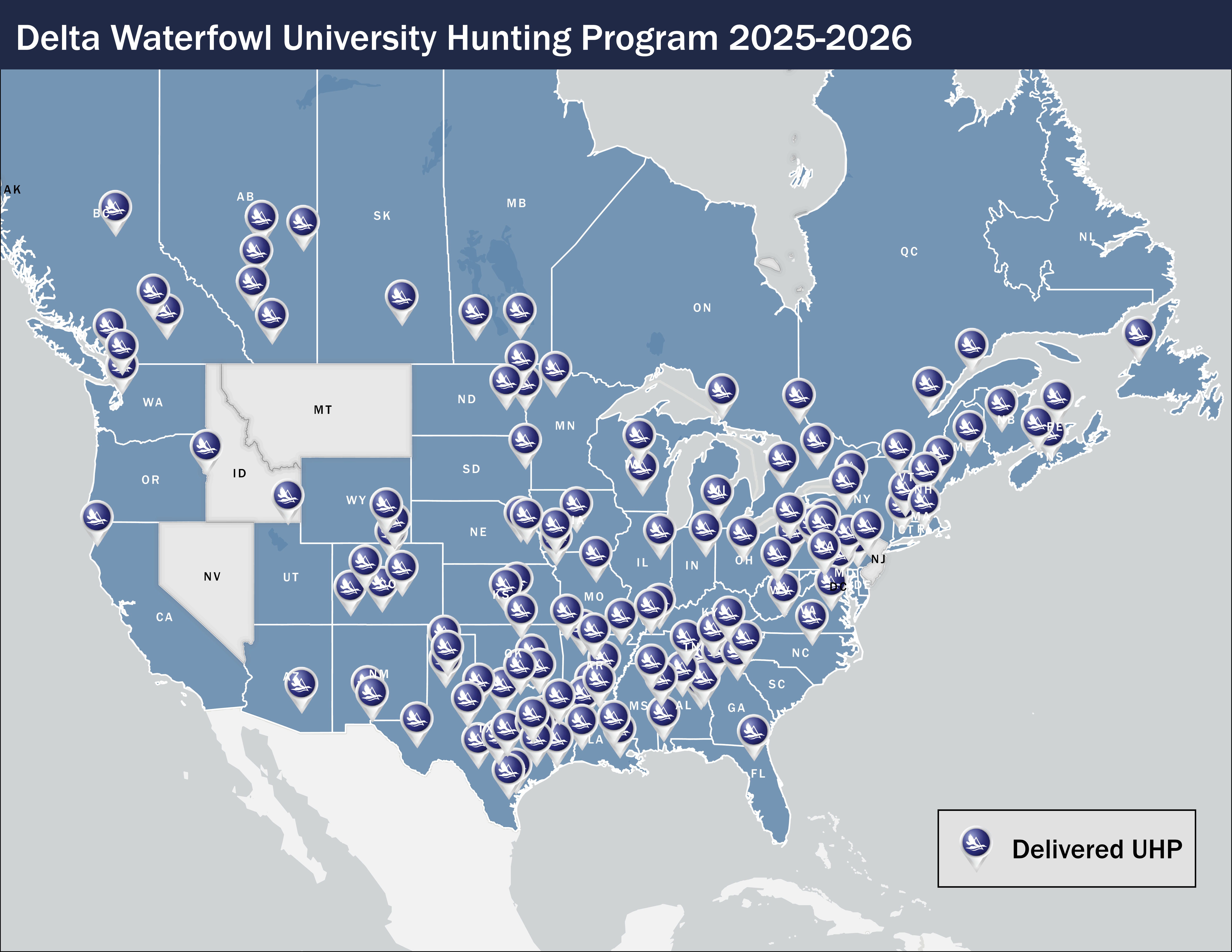University Hunting Program
INTRODUCING TOMORROW'S WATERFOWL MANAGEMENT LEADERS TO THEIR FIRST HUNTS
Delta’s focus on waterfowl hunters as the base of wetland and waterfowl conservation has made clear a looming crisis: Most wildlife management students — the future decision-makers of waterfowl management — have had little or no exposure to duck hunting or first-hand experience of the role of hunting in North American wildlife management. Not surprisingly, this has led to a generation of employed professionals who lack an understanding of the ecological, economic, recreational, and moral virtues of hunting.
At Delta, we see this as a huge problem for the future of hunting and management of wetlands and waterfowl. Students who don’t understand hunting and hunters might support policy and management decisions that do not sustain waterfowl and their required habitat at the same levels desired by hunters. These wetlands and associated uplands are important for a myriad of other species. We are already seeing a major change in emphasis away from game management in many of our state, provincial, and federal agencies.
Due to these concerns, Delta launched its University Hunting Program in August 2017.
Participating university students receive instruction as part of a regularly scheduled wildlife course. In many cases, participants earn bonus points/extra credit for the successful completion of the main program components:
• Hunter safety course requirement
• Shotgun skills training
• Mentored hunt at a quality hunting location
• Post-hunt meal and discussion
If you would like to learn more about the Delta Waterfowl University Hunt Program, donating to the UHP, bring the UHP to a school near you, please contact Stephen Sowell at ssowell@deltawaterfowl.org.

UHP Teaching Tomorrow’s Conservation Leaders
Delta program demonstrates the role of hunting to aspiring wildlife managers
The late November air was crisp, forming a thick haze across the expansive corn stubble and rendering a well-placed pit blind nearly invisible. Huddled inside, a crew of first-time goose hunters — wildlife management students participating in a Delta Waterfowl University Hunting program course — crouched with their instructor, Dr. David Koons, a wetland and waterfowl conservation professor at Colorado State University.
A safety briefing and information on what to expect when geese were spotted were provided. “One smooth move,” the students were told, would slide back their blind covers so they could shoot.
“More like 10 smooth moves,” joked Colorado State graduate student Kelsey Navarre, who’s researching lesser scaup, as she finagled her cover into position.
Then, the cries of Canada geese resounded above, and when a massive flight broke through the low ceiling, the novice waterfowlers were mystified. Despite gusty winds centering the birds perfectly, most students held their fire.
“They were so awed by the number and proximity of the birds that they developed ‘buck fever,’” Koons said. “Also, if you’ve never harvested an animal, that’s a powerful moment, and I’m sure it played a role. But they quickly pushed through and went full-bore.”
Delivered in partnership with universities throughout the United States and Canada, Delta’s University Hunting program arose in 2017 in recognition of a looming issue: Increasingly, aspiring biologists who will one day use hunting licenses and permit revenues to manage ducks, geese and other wildlife, are not hunters themselves.
“Not long ago, nearly every waterfowl biology student in North America was a dedicated hunter, but that’s no longer the case,” said Joel Brice, chief conservation officer for Delta Waterfowl. “We believe that’s a real problem because waterfowl managers need a sense of hunting culture and hunting’s role in conservation to set appropriate hunting regulations and effective wetland and waterfowl conservation policies. Our long-term plan is to expand the program to every major university on the continent offering a wildlife management degree.”
Buoyed by early successes, many more universities have expressed interest in implementing the program, so it undoubtedly will grow.
A wildlife professor at each University Hunting Program-enrolled school develops a course curriculum with guidance from Delta Waterfowl. Various hunting topics are included, with special emphasis on the critical role hunting plays in managing wildlife and funding wetlands and waterfowl conservation. However, arguably, the most impactful aspect of the course arrives at the grand finale: participation in an actual waterfowl hunt.
“If we can give the students that visceral experience of going on a hunt, it will leave a mark on their lives,” Koons said. “Even if they don’t become hunters themselves — though we hope they do — they’ll remember it someday when making high-level policy decisions.”
A group of Colorado State students will forever recall the foggy morning they spent hunting with Koons and guide Luke Schmidt of Last Pass Outfitters (who provided the hunt free of charge). Geese in groups of 25 to 100 repeatedly swarmed the spread.
“We had a morning of legs-down, wings-cupped geese, and incredibly, these first-time hunters began doubling,” Koons said. “One percent of me feels bad because they might never see something like that again.”
By 9 a.m., they’d shot limits of dark geese, plus a few snows and Ross’s geese. The unseasoned students, of course, lacked perspective.
“I’m told we were pretty spoiled,” said student Kristen Ellis, who enrolled in the course given her interest in wetland and shorebird research. “(Schmidt) was amazing with his goose call, and I loved watching his dog work. It was just a really cool experience, and I would definitely go again.” — Kyle Wintersteen
Get Involved
Check out all our upcoming events for a chance to connect with local duck hunters
Upcoming Events
NB013 - Monctons Muddy Waters Chapter
2/21/2026
Saturday, February 21, 2026 Irishtown, NB
View EventNS012 - Eastern Shore Chapter
2/21/2026
Saturday, February 21, 2026 Head of Chezzettcook, NS
View Event